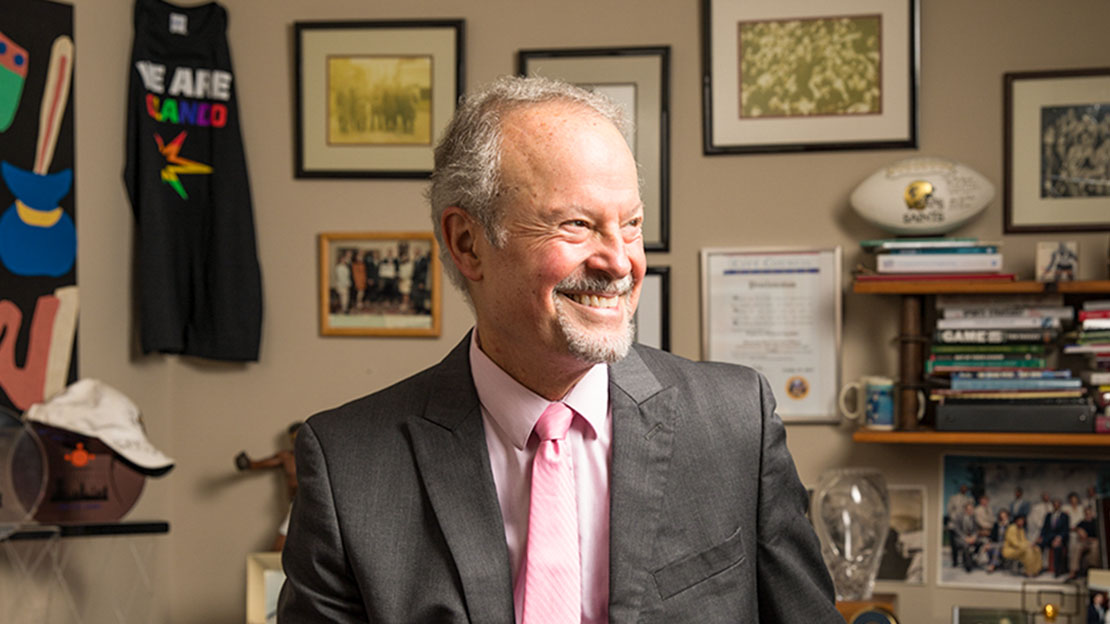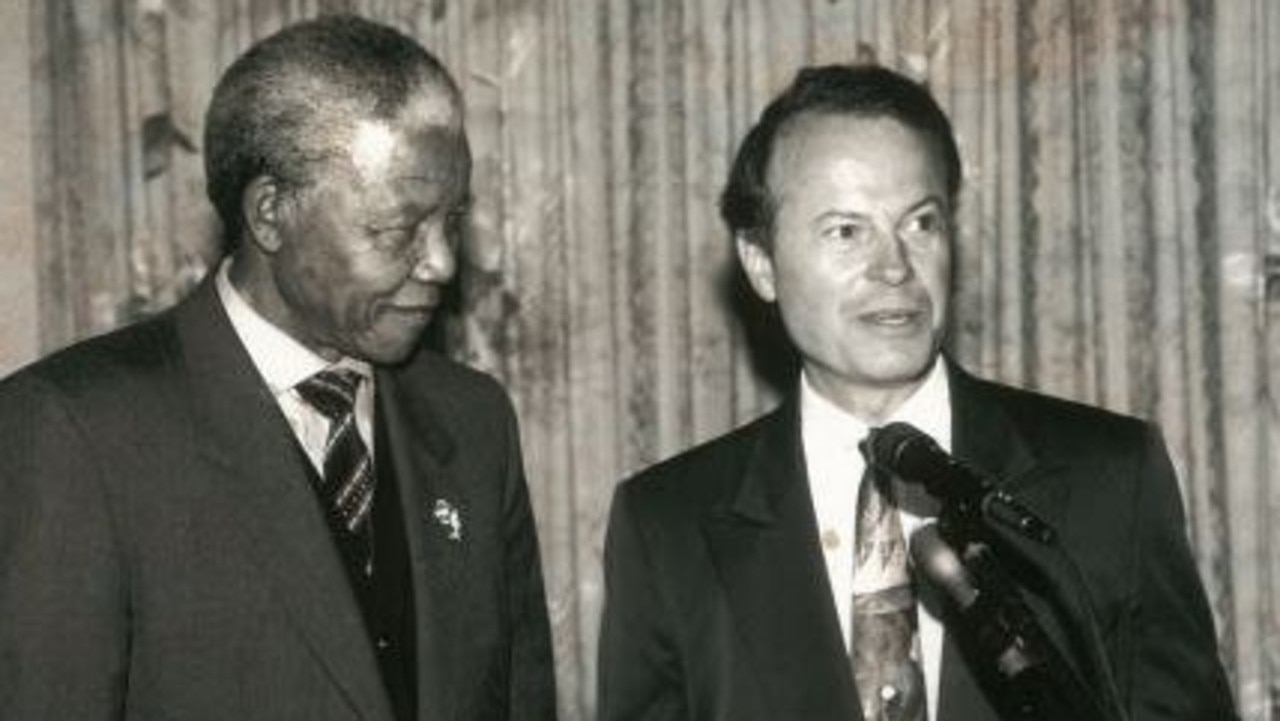By: Zachary Draves
He has been described as the “conscious of sport”. His pioneering work was instrumental behind the development of a whole new field of study. He is a man of vision, compassion, courage, innovation, and understanding who inspired many to take up the cause of justice through the lens of sport.
His name is Dr. Richard Lapchick.
(Courtesy: Ethan Miller/Getty Images)
At the 2023 ESPY Awards, Dr. Lapchick will receive the Stuart Scott ENSPIRE Award, named in honor of the late ESPN host. The award is recognizing “individuals that have taken risks and used an innovative approach to helping the disadvantaged through the power of sports.”
Nobody better to receive this honor.
“Certainly a peak moment, I have been fortunate to befriend a lot of amazing people over the years and I’ll be able to accept this award for those who are on the ground fighting for social justice,” said Dr. Lapchick.
His quest for social justice began almost from the time he came into this world. He is the son of the late Joe Lapchick, who played basketball for the Original Celtics of the American Basketball League (ABL) in the 1920’s and 1930’s. He would later become a coach for St. Johns and the New York Knicks.
Joe was perhaps best known for signing Nathaniel “Sweetwater” Clifton to the Knicks in 1950, one of the first African American players in the NBA. A story that is immortalized in the recent movie Sweetwater. The move was monumental at the height of segregation and the Lapchick family experienced a vicious backlash.

(Courtesy: Bettmann/Getty Images)
One of Dr. Lapchick’s first memories was being a five year old looking outside his bedroom window in Yonkers, New York and seeing his father’s image hung in effigy surrounded by a mob. He would also pick up the phone and would hear people shout racist language.
Those incidents had a profound impact on young Richard, in part because it was his best friend that became a target. It was through the guidance of his father that Richard realized what it meant to stand for something. Joe would tell him “a leader is someone who stands up for justice and doesn’t block its path.”
In his later years, Dr. Lapchick would follow in his father’s legacy and did his part for the cause of justice with sport being his teaching tool. Throughout the 1970s, he was a leader in the anti-apartheid movement and advocated for boycotting international sporting events in which South Africa competed in.
In 1978, while working as a Professor of Political Science at Virginia Wesleyan College, Dr. Lapchick took part in protests of the South African tennis team that participated in the Davis Cup tournament in Tennessee. Then one night he was attacked by two masked men in his college office who proceeded to carve the N-word in his stomach.
Three years later, while working as a liaison for the United Nations, his New York apartment was ransacked after he led a protest of the South African rugby team that competed in a US tournament.
In many ways it was a case of history repeating itself, but it only harnessed Dr. Lapchick’s desire for social change in the years ahead.
“I think that I was consistently working for social justice and nothing got in the way of being attacked in 1978 and being resisted over the years,” he said. “I saw the goal of equality and social justice and pursued it without disruption.”
Dr. Lapchick’s work would extend beyond the streets and the classroom and into the building of institutions. In 1984, he founded The Center for Sport in Society at Northeastern University. He also created a National Consortium for Academics and Sports, which priorities academic achievement for student athletes.
In 1985, he founded The Institute for Sport and Social Justice which creates opportunities on how to use sport for social change. He also created The Institute for Diversity and Ethics in Sport (TIDES) at the University of Central Florida. Through TIDES, an annual Racial and Gender Report Card is published outlining racial and gender hiring practices across all professional sports leagues.
Over the years he has cultivated friendships with some of the biggest names in sport and society including Muhammad Ali, Arthur Ashe, and his childhood friend Kareem Abdul Jabbar. He also received numerous honors and accolades for his work including being recognized as Muhammad Ali Humanitarian of the Year through the Muhammad Ali Center in 2021.

(Courtesy: University of Central Florida)

(Courtesy: Universtiy of Central Florida)
Perhaps his greatest honor was being an invited guest to Nelson Mandela’s Inauguration as the first black president of South Africa in 1994. It was the culmination of the work of both men to bring freedom and democracy.
(Courtesy: University of Central Florida)
After the inauguration, President Mandela had invited Dr. Lapchick to be a personal guest at a soccer match in South Africa. He had decided to opt out of inauguration celebrations and when asked by Dr. Lapchick why, President Mandela would explain to him that power of the sporting boycott was instrumental behind his release as a political prisoner after 27 years and breaking down the walls of Apartheid.
The recent surge in athlete activism stemming in large part from the murder of George Floyd in 2020 has given Dr. Lapchick hope after decades of sport being consumed by commercialism. He also points to the NBA boycott in the bubble in Orlando after the police shooting of Jacob Blake as another turning point.
“It is something that I hoped for”, he said. “When the Milwaukee Bucks didn’t come up for the playoffs protesting what happened in Kenosha, Wisconsin, it was the beginning of the revolution for athlete activism.”
Dr. Lapchick will accept the honor during the ESPYs preview show on Tuesday July 11th and will attend the ceremony on Wednesday July 12 in Los Angeles.

(Courtesy: Universtiy of Central Florida)
He will do so in honor of those who came before and those who he came after. When asked what he thinks Ali, Arthur, and Mandela would say to him, he remained profound.
“Thank you for being a troublemaker,” he said.
Given how proud his father would be of him, he added that both their stories being told and recognized are a “combination of things I will cherish.”
Dr. Richard Lapchick, the conscience of sport, now and forever.
